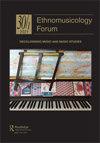谁的去殖民化?从跨国(中国)的角度检查交叉性、车道监管和学术特权
IF 0.5
1区 艺术学
0 MUSIC
引用次数: 2
摘要
这篇反思性的文章解决了当前世界各地关于非殖民化音乐倡议的不同/冲突预测的爆发点,包括在多个交叉背景下的对话前沿。我首先从我自己作为后殖民和跨国新加坡遗产的女性学者-音乐家-教育家的立场出发,主要是作为少数民族社区的成员在英国工作:在研究最近在英国多样化音乐课程和音乐表现的尝试之前,我回忆了东南亚/东亚音乐教育的超现实经历。我的观点必然受到特权(中国的、学术的、机构的)以及持续的、活生生的结构性种族主义经历的影响。结构性种族主义是我使用的复数词。我在这些模糊而令人担忧的空间中提出了关于音乐选择、代理和个人边界的问题——社交媒体和全球构造板块的变化越来越多地以新的方式重新校准,东亚(特别是中国)的崛起成为经济和音乐机会的源泉。在这里,对交叉性的理解至关重要,在这里,强调来自全球南方的观点以及全球北方的新配置,以及对学术特权和理想世界主义的考虑,也变得必要。本文章由计算机程序翻译,如有差异,请以英文原文为准。
Whose decolonisation? Checking for intersectionality, lane-policing and academic privilege from a transnational (Chinese) vantage point
ABSTRACT This reflective article addresses current flashpoints around different/conflicting projections on decolonial music initiatives around the world, including conversational fronts in multiple, intersectional contexts. I speak first from my own positionality as a woman scholar-musician-educator of postcolonial and transnational Singaporean heritage working primarily in the UK as a member of a minority community: I recall surreal experiences of music education in Southeast/East Asia before examining more recent attempts to diversify music curricula and music representation in the UK. My perspectives are necessarily shot with privilege (Chinese, academic, institutional) as well as with continued, lived experiences of structural racisms – a term I use in the plural. I pose questions about musical choice, agency and personal boundaries in these ambiguous and fraught spaces – increasingly recalibrated in new ways by social media and shifting global tectonic plates platforming the rise of East Asia (particularly, China) as a source of economic and musical opportunity. Here, understandings of intersectionality crucial, where the highlighting of perspectives from the Global South alongside new configurations of the Global North have also become necessary alongside considerations of academic privilege and aspirational cosmopolitanism.
求助全文
通过发布文献求助,成功后即可免费获取论文全文。
去求助
来源期刊

Ethnomusicology Forum
MUSIC-
CiteScore
1.10
自引率
25.00%
发文量
29
期刊介绍:
Articles often emphasise first-hand, sustained engagement with people as music makers, taking the form of ethnographic writing following one or more periods of fieldwork. Typically, ethnographies aim for a broad assessment of the processes and contexts through and within which music is imagined, discussed and made. Ethnography may be synthesised with a variety of analytical, historical and other methodologies, often entering into dialogue with other disciplinary areas such as music psychology, music education, historical musicology, performance studies, critical theory, dance, folklore and linguistics. The field is therefore characterised by its breadth in theory and method, its interdisciplinary nature and its global perspective.
 求助内容:
求助内容: 应助结果提醒方式:
应助结果提醒方式:


